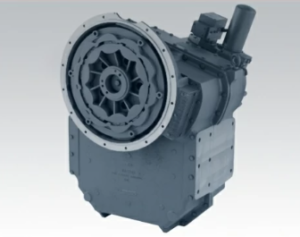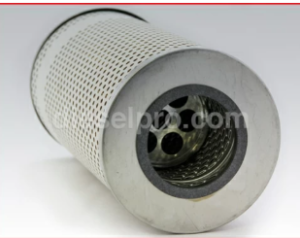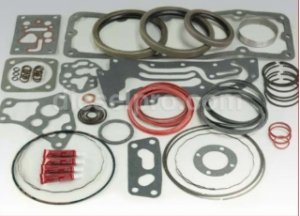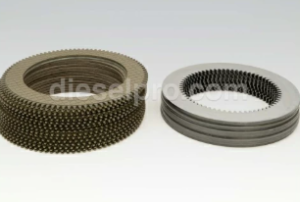
Introduction to Preventive Maintenance
Why It Matters for Twin Disc MG520 Marine Gear
Marine transmissions like the Twin Disc MG520 are critical to vessel operation. They transfer power from the engine to the propeller, enabling forward and reverse motion, speed control, and precise maneuverability in tight docking situations. For commercial vessels, ferries, tugs, and fishing boats, a failure in the marine gear system can result in expensive downtime, missed jobs, and dangerous situations on open water.
Preventive maintenance is the key to reliability and longevity. Rather than waiting for symptoms of failure, a proactive maintenance schedule ensures that the MG520 continues to deliver peak performance and reduces the likelihood of costly emergency repairs. By following an organized and consistent maintenance plan, you extend the life of your transmission, increase resale value, and preserve warranty coverage.
This guide outlines the recommended service intervals, critical tasks like oil changes and inspections, overhaul timing, and provides service log templates to help boat owners and marine mechanics document maintenance history effectively.
Note: For technical procedures and factory torque specifications, refer to the OEM Twin Disc MG520-1 service manual.

Parts Catalog for Twin Disc MG520 Marine Transmissions
Rebuilt Twin Disc MG520 Marine Transmissions
Plate Kit For Twin Disc MG520 Marine Transmission
Gasket Kits For Twin Disc MG520 Marine Transmission
Recommended Service Intervals For Twin Disc MG520 Marine Gears
Every transmission operates under different loads, environments, and usage patterns. That said, Twin Disc recommends service intervals based on hours of operation and calendar time, whichever comes first.
1. Daily or Every 8 Hours of Operation
These tasks are simple checks that prevent more serious issues from forming.
Daily Checks Include:
- Oil Level Check: Ensure the fluid is within the correct range on the dipstick.
- Visual Leak Inspection: Look for signs of oil leaks around input/output seals or oil pan.
- Noise Check: Listen for abnormal whines, clunks, or grinding.
- Engagement Response: Ensure the transmission engages gears promptly and smoothly.
2. Every 250 Hours or Monthly
This intermediate service interval is about catching early wear and maintaining cleanliness.
Monthly Maintenance Includes:
- Inspect Oil Quality: Check for discoloration, burnt smell, or metal particles.
- Top Off Transmission Fluid: Use recommended marine-grade transmission oil.
- Inspect Cooling System Lines: Ensure transmission cooler lines are not kinked or leaking.
- Check Clutch Engagement Pressure: Measured using hydraulic pressure ports if accessible.
3. Every 1,000 Hours or Quarterly

At this stage, you begin in-depth inspections of wear-prone components.
Quarterly Maintenance Tasks:
- Change Transmission Oil and Filter (if applicable).
- Inspect Clutch Plates (if accessible).
- Check Input/Output Shaft Seals for seepage.
- Tighten Mounting Bolts and Flanges.
- Perform Vibration Check of Gearbox and Shaft.
4. Every 2,000–3,000 Hours or Annually

This annual checkup includes a more comprehensive tear-down if wear is suspected.
Annual Service Tasks:
- Full Fluid Flush and Refill.
- Disassemble and Inspect Clutch Assemblies.
- Replace Seals and Gaskets.
- Micrometer Check of Bearings and Bushings.
- Inspect Couplings, Dampers, and Input Flanges.
5. Every 5,000–7,000 Hours or 3–5 Years

This is typically the recommended overhaul window for commercial vessels operating regularly.
Full Overhaul Should Include:
- Complete tear-down of marine gear
- New friction and steel clutch plates
- New bearings, bushings, thrust washers
- All new seals and gaskets
- Replacement or inspection of oil pump and cooling circuits
- Dynamic bench test or on-vessel validation
Note: For vessels under light duty or recreational use, this interval may extend to 10 years or more with consistent maintenance.
Oil Changes For Twin Disc MG520 Marine Gears

Protecting the Lifeblood of Your Marine Gear
Transmission oil is to the MG520 what blood is to the human body. It lubricates moving parts, disperses heat, and prevents metal-on-metal contact. Contaminated or degraded oil is one of the leading causes of gear and clutch wear.
When to Change the Oil
- Every 1,000 Hours: Under normal load and clean operating conditions.
- Every 500 Hours: In hot, humid, or dirty environments, or high-load duty cycles.
- Annually: Minimum once per year, even if hours are not met.
Signs That Oil Needs Changing Sooner
- Milky appearance (water intrusion)
- Strong burnt smell
- Presence of shiny metal flakes
- Foaming oil or erratic pressure
Steps for a Clean Oil Change:
- Warm up the engine to thin the oil.
- Shut off and let rest for 10 minutes.
- Remove drain plug and let all oil drain fully.
- Replace or clean oil strainer/filter.
- Install new gasket or seal ring on drain plug.
- Fill with correct marine transmission oil.
- Start engine and cycle gears.
- Top off to proper level after a few minutes of operation.
Oil Type Recommendation
Always refer to the OEM recommendation, but most Twin Disc MG520 operators use:
- SAE 30 or SAE 40 non-detergent oil
- Or ATF depending on the clutch design and operating environment
Make sure to avoid oils with detergent additives unless specifically listed as compatible. These can foam under high-load marine use and degrade performance.
Inspections For Twin Disc MG520 Marine Gears

What to Inspect and When
Routine visual and hands-on inspections help detect problems early. Here’s a guide for the most important inspections broken down by component.
1. Housing and Mounts
- Check for cracks, corrosion, and loose bolts.
- Look for any deformation due to misalignment or impact.
2. Input and Output Seals
- Inspect for oil seepage or dry, cracked rubber.
- Look for signs of contamination around the shafts.
3. Clutch Plates and Engagement
- Use inspection ports or pull covers if accessible.
- Engage the gear and listen for slipping or grinding.
- Check shifting responsiveness and clutch pack wear.
4. Oil Cooler and Lines
- Ensure oil cooler is not clogged.
- Confirm hose fittings are tight and not leaking.
- Use infrared gun to check oil return temperatures.
5. Bearings and Vibration
- Place vibration sensors or use handheld vibrometers.
- Monitor for bearing hum, gear chatter, or unusual harmonics.
- If accessible, use feeler gauges or micrometers to check play.
6. Oil Quality
- Pull dipstick and inspect for clarity.
- Run magnet through oil to detect metallic particles.
- Consider periodic oil sampling for lab analysis.
Overhaul Frequency
When and Why to Rebuild the MG520
A marine gear overhaul isn’t just about fixing a failure—it’s about restoring peak performance and extending service life.
Suggested Overhaul Timing
- 5,000–7,000 Hours for Heavy Use: Tugs, ferries, push boats, trawlers.
- 10,000+ Hours for Light Use: Recreational or low-hour vessels.
- Earlier If You Notice Symptoms: Slippage, excessive noise, overheating, oil contamination.
Benefits of Scheduled Overhaul
- Prevents sudden breakdowns on the water
- Restores original torque transfer and clutch performance
- Avoids damage to coupling and downstream driveline
- Preserves engine-transmission alignment
- Increases resale value with documented overhaul
Core Components to Replace During Overhaul
- Friction and steel clutch plates
- Bearings and bushings
- Shaft seals and gaskets
- Thrust washers
- Hydraulic pump components
- Transmission cooler and hoses (optional but recommended)
Always use a complete rebuild kit from a trusted supplier like Diesel Pro Power.
Service Log Templates For Twin Disc MG520 Marine Gears
Staying Organized with Maintenance History
A clear, consistent service log helps ensure your MG520 marine gear stays maintained, and gives mechanics a record to reference. It’s also a key factor in preserving resale value and warranty compliance.
Essential Service Log Entries:
| Date | Engine Hours | Service Performed | Parts Used | Oil Brand/Type | Notes |
| 2025-01-10 | 4,235 | Oil Change | N/A | SAE 40 ND | Oil dark, no debris |
| 2025-02-15 | 4,480 | Shaft Seal Inspection | N/A | N/A | Minor seepage noted |
| 2025-03-05 | 5,000 | Full Overhaul | Rebuild Kit #520R | SAE 40 ND | New clutches installed |
Use this format in a digital spreadsheet or a dedicated maintenance logbook.
Pro Tips for Record Keeping:
- Use engine hour readings, not just dates
- Save receipts and part numbers
- Include technician name or initials
- Photograph any unusual wear or failure
- Keep logs on board and in digital backups
Ensuring Warranty and Resale Value For Twin Disc MG520 Marine Gears
A well-documented maintenance history can dramatically increase the resale value of your vessel or equipment. Buyers trust boats with organized records and a demonstrated commitment to upkeep. For commercial operators, this also preserves fleet value and reduces audit risk for insurance claims or warranty coverage.
Why Maintenance Logs Matter:
- Proof of care: Shows future buyers and surveyors that the equipment has been maintained properly
- Warranty validity: Some aftermarket or OEM warranties require proof of oil changes and proper use
- Insurance compliance: Especially important after a claim or loss
Tips to Maximize Value:
- Attach parts invoices to maintenance logs
- Keep overhaul dates clearly marked
- Note serial number and model tags of replaced components
- Use branded parts from trusted suppliers
Diesel Pro Power Support
Your Partner in Twin Disc MG520 Marine Gear Preventive Maintenance
Whether you need a single seal or a full overhaul kit, the team at Diesel Pro is here to help vessel operators, commercial fleets, and independent mechanics keep their MG520 running at peak performance.
Available Support Services:
- Expert customer service by phone or chat
Browse Twin Disc MG520 Parts and Kits

Rebuilt Twin Disc MG520 Marine Transmissions
Plate Kit For Twin Disc MG520 Marine Transmission
Gasket Kits For Twin Disc MG520 Marine Transmission
Videos About Twin Disc Transmissions
6 Reasons Your Twin Disc Transmission Has Low Oil Pressure
7 Reasons Your Twin Disc Transmission Is Overheating
3 Reasons Your Clutch Plates in Your Twin Disc Transmission Are Making Excessive Noise
Bull Gear On A Twin Disc Transmission
Rebuilt Twin Disc Transmissions



 Free US Calls: 1-888-433-4735
Free US Calls: 1-888-433-4735 International: 305-545-5588
International: 305-545-5588